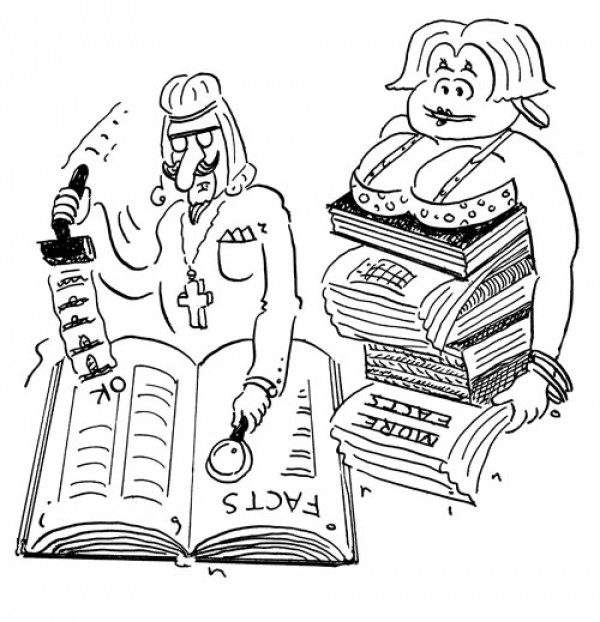
In a column a while back, you told your assistant Una to “quit with the Wikipedia” because “from the standpoint of reliability, Wikipedia might as well be written by gorillas.” The weekly science journal Nature reports Wikipedia contains less erroneous material than the Encyclopaedia Britannica. Are you willing to withdraw your sensational claim? —Conrad
Yes, I’ll withdraw it. From a reliability or any other standpoint, Wikipedia is considerably better than could be accomplished by gorillas. Put a gorilla in front of a keyboard and there’s a good chance he’ll crap on it. Few Wikipedia articles descend to this level. On the contrary, for settling bar bets, satisfying idle curiosity, or, truth be told, getting an initial fix on a serious research subject, Wikipedia is an indispensable resource. The problem is when even those who know better rely on Wikipedia as the last step rather than the first in finding the facts.
For example, in a recent piece on Dutch architect Rem Koolhaas in the New York Review of Books critic Martin Filler made several factual errors. When the architect complained, Filler petulantly replied, “I am surprised that for someone so concerned about his image and the spread of misinformation, neither Koolhaas nor his office has bothered to correct his Wikipedia entry.”
In other words, it’s not my fault for relying on a flaky source. It’s your fault for not correcting my flaky source. How’s that for brass balls?
Wikipedia is the premier example of the Internet phenomenon known as crowdsourcing, in which people spontaneously cooperate for the greater good. By many measures, it has become the world’s leading reference resource, with 22 million articles in 285 languages, including 4 million articles in English. According to the Alexa tracking service, Wikipedia is the sixth-most visited website in the world. All articles are contributed by volunteers, who are free to muck up the contributions of everybody else. The enterprise is supported at some remove by the Wikimedia Foundation, which employs a staff of about 140. I get much of this from the Wikipedia article about Wikipedia, meaning that if I submitted this column as a scholarly paper to any properly run institution of higher learning, I would get and deserve an F.
The question isn’t whether Wikipedia is reliable. No one with a grasp of the situation contends it is, including co-founder Jimmy Wales. Wales justly observes that serious researchers would be foolish to rely on any encyclopedia. (My assistant Little Ed once contributed articles to the Encyclopaedia Britannica, which tells you a lot right there.) Producing a compendium of human knowledge (e.g., the one you’re reading) is inherently messy. Given the staggering mass of what’s knowable, only wikimethodology offers a hope of getting a real handle on it. But the collective result is a tip sheet at best.
Not saying it’s a bad tip sheet. In 2006, Nature asked experts to compare articles on 42 topics at Wikipedia and Britannica and concluded ... well, not that Wikipedia had “less erroneous material,” Conrad; you’re hallucinating. The magazine said “the difference in accuracy was not particularly great.” Each source had four serious errors. Britannica fared better on minor errors, with 123 versus 162 for Wikipedia. Affronted Britannica editors felt that was a big difference; Nature evidently didn’t.
But counting up random errors misses the point. No doubt some Wikipedia articles are sterling examples of the encyclopedist’s art; others suck. The difficulty is it’s not always obvious which is which. The saving grace of Wikipedia in this respect is its often-wretched prose. If an article appears to have been translated from the Magyar by robots, even credulous readers won’t take it too seriously.
The more serious concern is smoothly written crap. Writers for prestigious journals are sometimes taken in. The misinformation Martin Filler got was inconsequential, but that’s not always true, particularly in the case of controversial subjects. Nature notes the long-running “edit war” over Wikipedia’s global-warming article, in which an expert on the subject spent months fending off idiotic emendations by anonymous opponents.
OK, few world leaders look to Wikipedia for policy guidance. But on everyday matters, authentic-sounding nonsense can do real harm. A 2008 study comparing the accuracy of drug information on Wikipedia and Medscape found Wikipedia’s answers were less complete, contained more errors of omission, and provided no correct dosing information. (In fairness, Wikipedia made fewer factual errors.)
This isn’t to say nobody should use Wikipedia; quite the contrary. At the Straight Dope, it’s often the first thing we look at, first for a quick fill on subjects of interest and second to get citations for dependable sources. Providing a starting point for further investigation is all nondelusional Wikipedia editors aspire to accomplish.
Many Wikipedia articles are now wisely prefaced with warnings about dubious aspects of what lies below. Probably it would be helpful if all popularizers, including Wikipedia, Britannica, and us at the Straight Dope, permanently emblazoned at the top of our pages BELIEVE NOTHING YOU READ HERE. IT MAY ALL BE LIES.
Send questions to Cecil StraightDope.com or write him c/o Chicago Reader, 11 E. Illinois, Chicago 60611. Subscribe to the Straight Dope podcast at the iTunes Store.